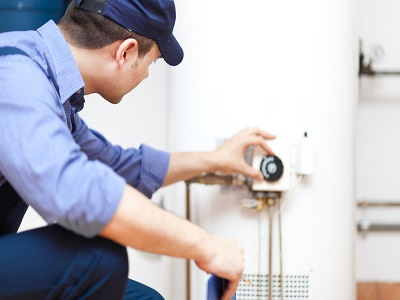 Your home’s hot water heater, like all major appliances, will eventually become less efficient and need to be replaced. It is important to replace your water heater before it breaks down. This will not only ensure your comfort but also your safety.
Your home’s hot water heater, like all major appliances, will eventually become less efficient and need to be replaced. It is important to replace your water heater before it breaks down. This will not only ensure your comfort but also your safety.
A standard water heater should last approximately ten years before it needs to be replaced. However, there are many factors that can reduce or increase the life expectancy of your appliance. Regular maintenance and the use of a water softener will increase your appliance’s lifespan. However, hard water, damp climates, and extreme temperatures could make it more costly to repair.
This post will help you recognize the warning signs of a failing heater and give you plenty of time to plan for replacement. Contact a Myrtle Beach plumber immediately if you need assistance with hot water heater repair or water heater replacement.
1. Appliance Age
Your water heater’s age is the most obvious sign it is time to replace it. Regular maintenance can prolong the life of your water heater, but it is best to budget for a new heater installation once your heater has reached ten years. This lifespan is only an estimate. Your unit could age faster if it is in a humid environment or near extreme temperatures. Your water heater may age faster if it is exposed to water with a high mineral content.
2. Leaking/Seeping
Water heaters should be replaced if there is any evidence of water pooling or dampness around the heater. The water heater’s metal tank is constantly exposed to extreme temperatures. The metal’s natural response is to expand and contract in accordance with temperature fluctuations. These repeated contractions can lead to metal cracking as the heater ages. It is important to immediately contact a professional plumber in Myrtle Beach if you see water seeping from your heater or spot damp areas. If not addressed promptly, small leaks can quickly escalate into serious and dangerous ruptures.
Your water heater will begin to age and bits of the tank metal may seep into your water. It is possible that your water heater needs to be replaced if you notice or smell rusty water coming out of your faucets.
4. Fluctuating water temperature
Water heaters age and supply lines can become partially blocked, which reduces the unit’s ability to supply water. Extreme temperature fluctuations can occur when this happens. This could be a sudden surge of cold water during a hot shower or hot water that fluctuates between boiling hot and freezing while you run.
5. Visible Rust
Over time, the metal tank and connections to your old water heater will begin corroding. You may see rust around the connections that connect the water heater’s inlet and outlet pipes. You may notice rusty flakes or water that is rusty-colored in your tubs, sinks, or faucets if the corrosion has occurred inside the tank. Any visible signs of rust should be considered a sign that your water heater needs to be replaced.
6. Rising utility bills
Over time, a water heater that is older will lose its effectiveness. The unit will require more energy to heat water consistently as it becomes less efficient. Water heaters may be more likely to cycle between heating phases, which can lead to significant increases in energy bills. A water heater that is corroded or has begun to deteriorate may cause a buildup of debris in the pipes connecting to the unit. Reduced water flow can lead to reduced water usage, which could result in higher water utility bills. You may have noticed an unrelated rise in your energy or water utility bills. It is time to get professional help for hot water heater replacement.
For professional plumbers
Many people try to delay the purchase of a new water heater. This is understandable. However, an old water heater is more than an inconvenience. An aging water heater tank, or corroded connections, can cause sudden leaks or even rupture. These events can cause serious damage to nearby structures and items, and hot water can lead to serious injury if it ruptures while someone is in the vicinity.
Watch out for signs that your older water heater is about to go bad. You should immediately contact a professional plumber if you notice any of these symptoms.
Call Blue Ribbon Plumbing LLC now and let us help you with all your plumbing problems.
Like our Facebook page for more great info about plumbing services.
Blue Ribbon Plumbing LLC
4201 Carolina Exchange Drive Suite 202
Myrtle Beach, SC 29579
(843) 267-9733
Serving all of Horry County including Myrtle Beach, North Myrtle Beach, Little River, Murrells Inlet/Garden City, Surfside Beach, Carolina Forest/Forestbrook, Conway/Aynor


